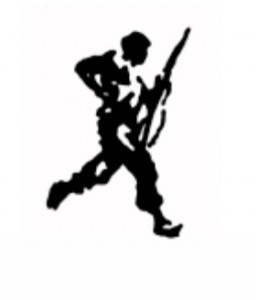Ricardo Diaz of the Mac-Paps by unattributed
 The Volunteer for Liberty, V. 2, Special 15, April 9, 1938, p. 2.
The Volunteer for Liberty, V. 2, Special 15, April 9, 1938, p. 2.
When I asked Capt. Diaz to give me his life story, he smiled and said it was unimportant. This time Capt. Diaz was wrong. The lives of all anti-fascists are important in these decisive days, especially those who have proved themselves capable of leadership where the struggle has sharpened to war.
Ricardo Diaz is small, but tough. He was born into a family where the cause of the working class was already a tradition. Diaz entered into his tradition and never found a reason to turn aside. In early days he came up against that opposition to those who stand up for the rights of the workers which all of us have encountered in one form or another. These experiences toughen a man, but at the same time they make him more human. Diaz has learned the value of good comradeship; his toughness is not the hard brutality of the man who fights only for himself. Diaz greets you with an unaffected air of welcome that makes you feel he likes you as much as you like him.
His firs years were spent in Africa. His father worked as a mason in Tangier, and occupied his spare time with political work. Young Ricardo followed suit, and before long was serving on a Committee of Action, which as its name suggests, continually and inevitably collided with the opposition. As a result Ricardo had several prison sentences to his credit before the Civil War broke out, and was well acquainted with the fascist mentality.
When he heard that military rebellion had broken out in Spain, he sailed for Barcelona and enlisted in the militia. His unit marched up to the Huesca front, armed mainly with sticks. We who know the Republican Army as it is today would imagine that without rifles nobody could hold a position, let alone advance. The militia advanced. Capt. Diaz states that the defending troops were men of the Civil Guard, and at the first approach of opponents who clearly meant business they ran away. One hill held out, and the militia were stumped, until the Durruti Column came up with rifles and stormed the position.
Diaz left Aragon and was sent down to Madrid, where he joined the newly-formed 14th International Brigade. His fluent command of French was a useful talent among the French volunteers. He could also speak to the Moor in their own language when the prisoners started coming in. These were the days when the Moors crept up at night and used their knives; these were also the days when the Moors fell in hundreds in front of our machine guns, while Madrid stood triumphantly untaken.
In course of time Diaz was sent to the Officer’s School of the Internationals, and after working through the course went on to join then new Mac-Pap Battalion at the training camp. He came up with this battalion to join the XV Brigade and went into action at Fuentes, after which he received Lieutenant’s rank.
In the action at Teruel in January he was one of three officers of our Brigade who received the special honor of being promoted on the field, under recommendation from Modesto, commanding the Fifth Army Corps. His company occupied the dangerous position on the battalion’s flank. There are men in that company who state that they owe their lives to Diaz and two or three others, who at great risk to themselves took up a position from which they were able to protect the withdrawal of this group with effective covering fire. Subsequently in the attack on Atalaya Diaz’s company was selected to go forward as advance guard because it was considered an especially reliable unit. At the present time Capt. Diaz is acting commander of the Mac-Paps while Major Smith is away.
I asked him for his estimate of the present military situation. He smiled again and said he was no prophet; but it looked to him as if Franco was making a big push under orders from his masters in Germany and Italy, who wanted the war won quickly and their material returned. If that is the case, he went on, our first and all — important duty to make our lines impregnable in the face of all fresh fascist efforts — in other words, to fortify and stand firm. Franco’s strength will break on our solid resistance, and his master’s wishes will prove impossible to carry out. Meanwhile his temporary successes have done us one good turn. They have awakened those elements in the rearguard who were still sleeping. From now on we shall see better coordination and a faster rate of work. Strengthened in the rear and fortified in the front, we shall weaken the power of the fascist drive and finally turn it until we press forward ourselves and hasten the day of victory.
“And then?” I asked. “What do you plan to do when the war has been won?”
This time Capt. Diaz laughed outright. He said that he was far too busy to think about what he would do after the war. He had a “novia” in Africa. He would marry her and return to Spain to continue working for the Spanish people. There would still be much to do. More than that he could not say.












